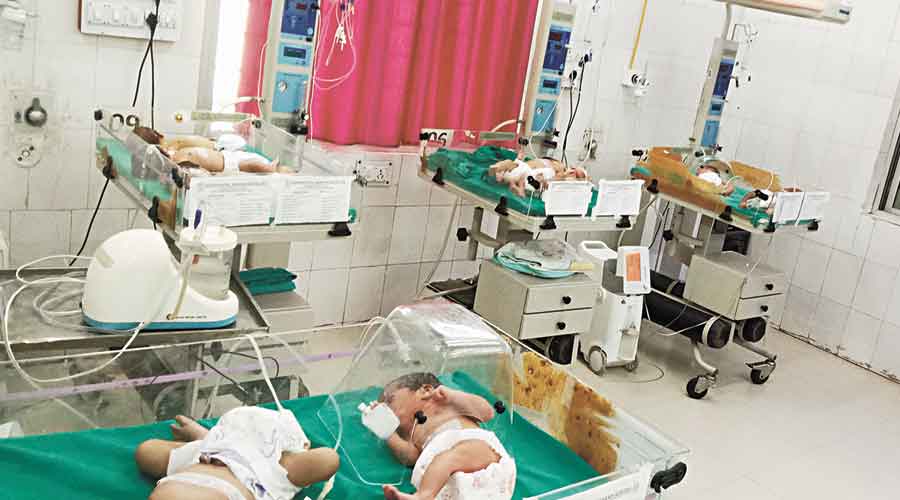Physical distancing is the rule everywhere in the Covid era, except at the neonatal intensive care units of Bihar government hospitals where severely ill newborns and premature babies share life-saving machines against all medical norms.
That’s because only a few of the phototherapy machines and radiant warmers are functional at these hospitals and the government has been dragging its feet in repairing or replacing the inoperative ones, doctors and health officials said.
When Sita Devi gave birth to a boy about a week ago at the Sasaram district hospital, around 150km southwest of Patna, her joy was short-lived.
The doctors at the hospital said the newborn had various complications and must spend a few days in the neonatal intensive care unit (NICU).
Sita Devi’s anxiety grew when she learnt that at the NICU, the boy was sharing phototherapy machines and radiant warmers with two other newborns — a strict no-no under medical guidelines because it multiplies the chances of infection.
Phototherapy is used to treat jaundice in newborns while radiant warmers are beds that maintain babies’ body temperature.
“I asked the doctors not to have him share the machines with other babies as he might catch an infection, but my request fell on deaf ears,” Sita Devi’s father Monuji Pandey, a resident of Kothuan village in Rohtas, told The Telegraph on Friday.
“We are common people with no power: what could we have done? We are just enduring everything and hoping he would be well soon.”
Doctors and health officials said the same situation prevailed in government hospitals across the state, from Purnea, Kishanganj and Darbhanga to Madhubani, Sitamarhi, East Champaran and Gopalganj.
Dr Sudhir Kumar, civil surgeon of Rohtas district where Sasaram falls, accepted that newborns were sharing these life-saving machines at the district hospital and that “it cannot be called proper from any angle because it can lead to infections”.
“But what can we do? The machines keep developing faults. Repair takes time and the patient load keeps increasing. We try to manage the situation somehow and keep the babies safe,” he said.
The Sasaram hospital’s manager, Sanjeev Madhukar, said the phototherapy machines and radiant warmers cost Rs 60,000 to Rs 65,000 each.
He said the hospital had received six phototherapy machines and six radiant warmers in 2011-12 but half of them were now defunct.
He said initially when they developed snags, the hospital got mechanics from Patna to repair them but they had become “irreparable” some eight to nine months ago.
“We requisitioned the Bihar Medical Services and Infrastructure Corporation Limited for more machines around two months ago but have not yet received a response,” Madhukar said.
He did not explain why the requisitions had not been made earlier, before any machine had become completely defunct.
“Two to three infants have to share a single machine” at the East Champaran district hospital, a government doctor posted in the district said, asking not to be identified.
“Some of the babies catch infections and die. Some become so ill that the development of their body and brain suffer. The situation could have been averted with just a little attention from the government.”
Kishanganj civil surgeon Shreenandan accepted that several phototherapy machines and radiant warmers in his district were unusable and babies had to share the functional ones.
Purnea civil surgeon S.K. Verma acknowledged the machine-sharing but avoided mentioning a specific reason, saying “there are more babies than machines available”.
Gopalganj civil surgeon Yogendra Mathur said: “You are talking about these machines? Our paediatric department doesn’t even have chairs for doctors or examination tables for patients.”
He said he was trying to sort things out.
Bihar government statistics show that the neonatal mortality rate is 25 per 1,000 live births in the state compared with the national average of 23.
A call to state health minister Mangal Pandey on early Friday evening was received by an aide who promised to ring back with the minister on the line. The call had not come till late in the night.
A call to health department principal secretary Pratyaya Amrit went unanswered.











